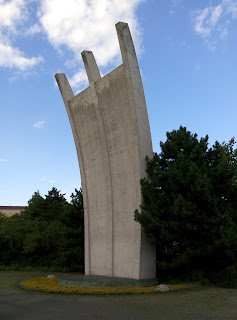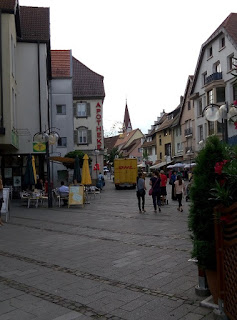I've been strangely apposed in writing about Berlin,
probably because the tsunami of feeling I washed away in (and I am still
swimming in). It is easy for me to step back and be objective about other
locations but when the houses I grew up in, the school I graduated from, the
places I worked at are still standing, and I'm standing in front of them, awed
at how time seems to be playing on 2 levels – the past and the present...
Berlin blew me away.
From the moment of arrival after an 8-hour train ride and
checking into my hotel just before 9PM, I was beset by a twilight sense of
wonder. Not the least of it was caused by... how long has it been since you've
seen a hotel room with an actual key, hanging on a big brass fob?
My hotel was one street over from Kurfurstendamm,
affectionately referred to as the Ku'damm, the city's premier walking and
shopping street. I used to “run the Ku'damm” when I was a teenager. Tired and
overwhelmed, still I couldn't resist: I took off walking. I had to lay eyes on
Rememberance Church, bombed out during World War II and left as a visual
reminder of hatred and fear, and one man's desire to rule the world.
My friend Sam said it best: Germany remembers her history. I
agree with him. Everywhere amidst the modern, you see the old, even in the most
modern of German metropoli: Berlin.
Here, I am torn: should I include pictures you could easily
find by a simple internet search, or pictures of my life growing up? For
example, here is where I lived when I was fourteen (first window by the tree
was my room):
If you like doing internet searches, here are some things to
look for in Berlin: Alexanderplatz, Reichstag, Brandenburg gate, Charlottenburg
Palace, Gedachnisskirche, Tempelhof, Berliner Dom, Funkturm, Checkpoint
Charlie.
My first full day there, after a fitful night's sleep in
spite of the long train ride and all of the walking, I rented a bike and
visited all of those places, dawdling at Alexanderplatz. When I called Berlin
home, that location was walled off but made famous by the atomic clock and the
television tower.
Legend has it that that tower was built when TV came into
vogue, and it was to be a showpiece of East Berlin's progressiveness. The ball
housed an exclusive restaurant that people vied to eat at. The only problem was
that the tower was close to The Wall, so patrons could dine while longing for
freedom in the west. In fact, as the story goes, everyone sat on the west side
of the restaurant, hoping their weight would be enough to topple the tower into
the west, thus forcing a path to freedom. In response, the restaurant was
renovated to include a rotating floor, so that nobody could be exposed to only
a western view.
The last standing guard tower, one of the few remaining
remnants of Soviet occupation, is tucked away on a side street, behind – of all
things, the Spy Museum. It is not very tall; 4 meters at most. After the
custodian showed me on a map which part of the wall that tower overlooked, I
was able to climb inside. I was hard-pressed to imagine the no-man's land this
horrid relic oversaw for all of the new buildings that surrounded it but I had
no problem picturing the bleakness of existence for the people in that part of
the world during the 28 years the wall was up.
I had been there during that time, after all.
The names! The places!
The next day I paid a day fare and rode buses to everything
I remembered of my youth. Nothing had changed. From the bus window I saw the
Outpost movie theater, where I had my first job. These days it is a museum for
Allied artifacts. (You can find its picture on the 'Net, too)
Getting off at Oskar-Helene Heim, I walked through the
former Berlin Brigade housing area to the apartment I lived in when my daughter
was born.
From there it was off to Goertzallee, where I worked as a
Supply and Services clerk. On the way I passed McNair Barracks, formerly home
to the 6th Infantry brigade where my husband was assigned to, now
condominiums.
And then it was off to my old high school, and the ice cream
store where we would get ice cream after class.
I finally found my way to Steglitz, another place younger me
had hung out and shopped.
The day was waning and I was tired from all this
rediscovering and, quite frankly, the emotional toll this Remembrance Tour was
taking on me. Still, I had to make my way to Tempelhof, the site of the famous
Air Bridge.
Immediately after World War II, while the Allied Forces were
still negotiating territory, the Soviets had completely encircled West Berlin
with the intent of driving the allies out, thus claiming that strategic city
for themselves. No food, water, electricity or supplies could get past those
barriers. People in post-war Berlin were starving and freezing to death in
their bombed out homes. The Allied command – British, French and American,
quickly devised a plan.
They would fly supplies into the besieged city! I can't
imagine the planning and logistics that went into this effort but, every 45
seconds, a plane touched down at Tempelhof, loaded with food, medicine, and
other vital materials. This went on for nearly a year: from June 1948 to May
1949. This statue commemorates the 3 Allied Powers's efforts.
Of course, there's more to that story than this short blurb.
If you're interested, here's a great link:
https://history.state.gov/milestones/1945-1952/berlin-airlift
Mother's Day: I reserved the last day for my mother: where
she lived, where she worked and where she rests.
I was physically and emotionally exhausted. I couldn't bear
any more memories but I owed, and was owed this tribute.
16 Kaunstrasse, where she lived, is now a doctor's building.
I had held a dim hope that her landlady might still be alive; I could thank her
for attending to my mom. I am cravenly grateful she was not to be found.
BB shopping center, where she worked, is still there, but it
no longer caters strictly to Americans. In fact, there might not be any
Americans there.
Friedhof Dahlem is where, supposedly, my mother is buried. I
could not find her grave but I walked through anyway. German graveyards look
more like parks than graveyards. It was a peaceful letting of stormy emotions.
Back to the pulsing life of the Ku'damm. It is time to shop
for my loved ones, in China and America. And time to let go of the past.


































